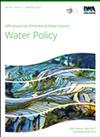Manafwa流域和Kyoga湖流域高暴露系统中家庭洪水风险应对策略的决定因素
IF 1.8
4区 环境科学与生态学
Q4 WATER RESOURCES
引用次数: 0
摘要
洪水对乌干达家庭的影响越来越严重。人们通常认为居住在河边地区的人们已经适应了洪水的脉动。然而,在大多数情况下,家庭一级的减少风险战略不足以确保生计抵御洪水。本研究的目的是调查乌干达东部Manafwa流域家庭应对策略决策的决定因素。该研究基于2019年3月在Butaleja地区对210户家庭进行的实地调查,并辅以重点小组讨论和关键信息提供者访谈。本研究采用保护动机理论框架,运用多元probit模型。最常见的短期应对策略是建造临时堤防(37%),而植树造林(44%)是最常见的长期解决方案。一致且显著影响所采取应对策略选择的决定因素是:家庭规模、家庭中成年男性人数、房屋在洪泛区内的位置和在受灾地区居住的时间(P > 0.05)。从政策角度出发,本研究建议相关利益相关者干预应考虑这些决定因素,以增强农户对洪水的适应能力。本文章由计算机程序翻译,如有差异,请以英文原文为准。
Determinants of households' flood risk coping strategies in a high exposure system of the Manafwa catchment and Lake Kyoga Basin
The impact of floods on households in Uganda is becoming increasingly severe. It is often assumed that people who reside in a riverine area have adapted to flood pulses. However, in most cases, household-level risk reduction strategies are inadequate for ensuring a livelihood resilient to floods. The objective of this study was to investigate the determinants of households' decisions on coping strategies in the Manafwa catchment, Eastern Uganda. The study was based on a field survey of 210 households supplemented with focused group discussions (6) and key informant interviews (4) conducted in the Butaleja district in March 2019. The study used the protection motivation theory framework and applied the multivariate probit model. The most common short-term coping strategy was building temporary embankments (37%), whereas afforestation (44%) was the most common long-term solution deployed. The determinants that consistently and significantly influenced the choice of coping strategies adopted were: family size, number of adult males in the family, location of the house within the floodplain and time of residence in the affected area (P > 0.05). For policy purposes, this study recommends that the relevant stakeholder interventions should consider these determinants, in order to enhance the adaptive capacity of rural households to flooding.
求助全文
通过发布文献求助,成功后即可免费获取论文全文。
去求助
来源期刊

Water Policy
环境科学-水资源
CiteScore
3.10
自引率
12.50%
发文量
81
审稿时长
6-12 weeks
期刊介绍:
Water Policy will publish reviews, research papers and progress reports in, among others, the following areas: financial, diplomatic, organizational, legal, administrative and research; organized by country, region or river basin. Water Policy also publishes reviews of books and grey literature.
 求助内容:
求助内容: 应助结果提醒方式:
应助结果提醒方式:


